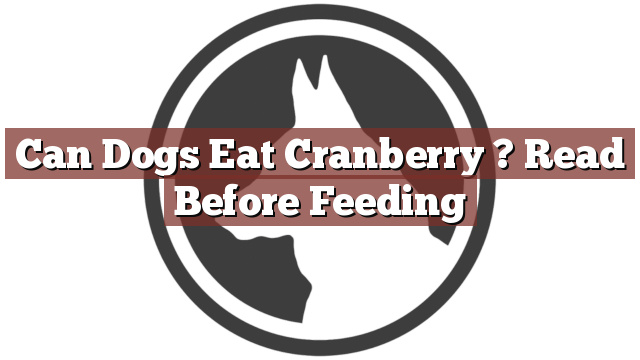Understanding Your Dog’s Dietary Needs
As pet owners, it is our responsibility to ensure that our dogs are getting the proper nutrition they need to stay healthy. Understanding their dietary needs is crucial in providing them with a well-balanced diet. While dogs are primarily carnivorous, they can benefit from some fruits and vegetables in moderation. However, it is important to be aware of what is safe and what is not for our furry friends. In this article, we will explore whether dogs can eat cranberries and what factors should be considered before feeding them to our beloved pets.
Can Dogs Eat Cranberry? Read Before Feeding
Can dogs eat cranberries? The answer is yes, but with caution! Cranberries are a nutritious fruit for humans, rich in antioxidants and vitamins. However, when it comes to our canine companions, there are a few things to keep in mind. While cranberries themselves are not toxic to dogs, they can cause some digestive issues if consumed in large quantities or in certain forms, such as sugary cranberry sauce. Therefore, it is important to feed cranberries to your dog in moderation and in a safe way.
Pros and Cons of Feeding Cranberry to Dogs
Feeding cranberries to dogs can have its benefits, but it also comes with some potential drawbacks. One of the most significant advantages of including cranberries in your dog’s diet is their high antioxidant content. Antioxidants can help boost the immune system and protect the body against harmful free radicals. Cranberries also contain natural compounds that can prevent bacteria, including those responsible for urinary tract infections, from adhering to the urinary tract walls in both humans and dogs. Therefore, feeding cranberries to your dog can potentially promote urinary tract health.
On the other hand, it is important to be aware of the cons of feeding cranberries to dogs. Cranberries are acidic, which means they can upset your dog’s stomach if given in excessive amounts. Furthermore, some dogs may be allergic to cranberries or have a sensitive digestive system that cannot tolerate this fruit. Therefore, it is crucial to monitor your dog’s reaction when introducing cranberries into their diet and consult with a veterinarian if you have any concerns.
Conclusion: Cranberry Can Be Beneficial in Moderation
In conclusion, dogs can indeed eat cranberries, but moderation is key. As with any new food, it is essential to introduce cranberries gradually into your dog’s diet and observe their reaction. Remember to always choose fresh cranberries or unsweetened cranberry products without any additives. If your dog shows signs of digestive distress or allergies after consuming cranberries, it is best to avoid feeding them this fruit. Ultimately, consulting with a veterinarian is always recommended to ensure that your dog’s dietary needs are met safely and appropriately.
Thank you for taking the time to read through our exploration of [page_title]. As every dog lover knows, our furry friends have unique dietary needs and responses, often varying from one canine to another. This is why it's paramount to approach any changes in their diet with caution and knowledge.
Before introducing any new treats or making alterations to your dog's diet based on our insights, it's crucial to consult with a veterinarian about [page_title]. Their expertise ensures that the choices you make are well-suited to your particular pet's health and well-being.
Even seemingly harmless foods can sometimes lead to allergic reactions or digestive issues, which is why monitoring your dog after introducing any new food item is essential.
The content provided here on [page_title] is crafted with care, thorough research, and a genuine love for dogs. Nevertheless, it serves as a general guideline and should not be considered a substitute for professional veterinary advice.
Always prioritize the expert insights of your veterinarian, and remember that the health and happiness of your furry companion come first.
May your journey with your pet continue to be filled with joy, love, and safe culinary adventures. Happy reading, and even happier snacking for your canine friend!

